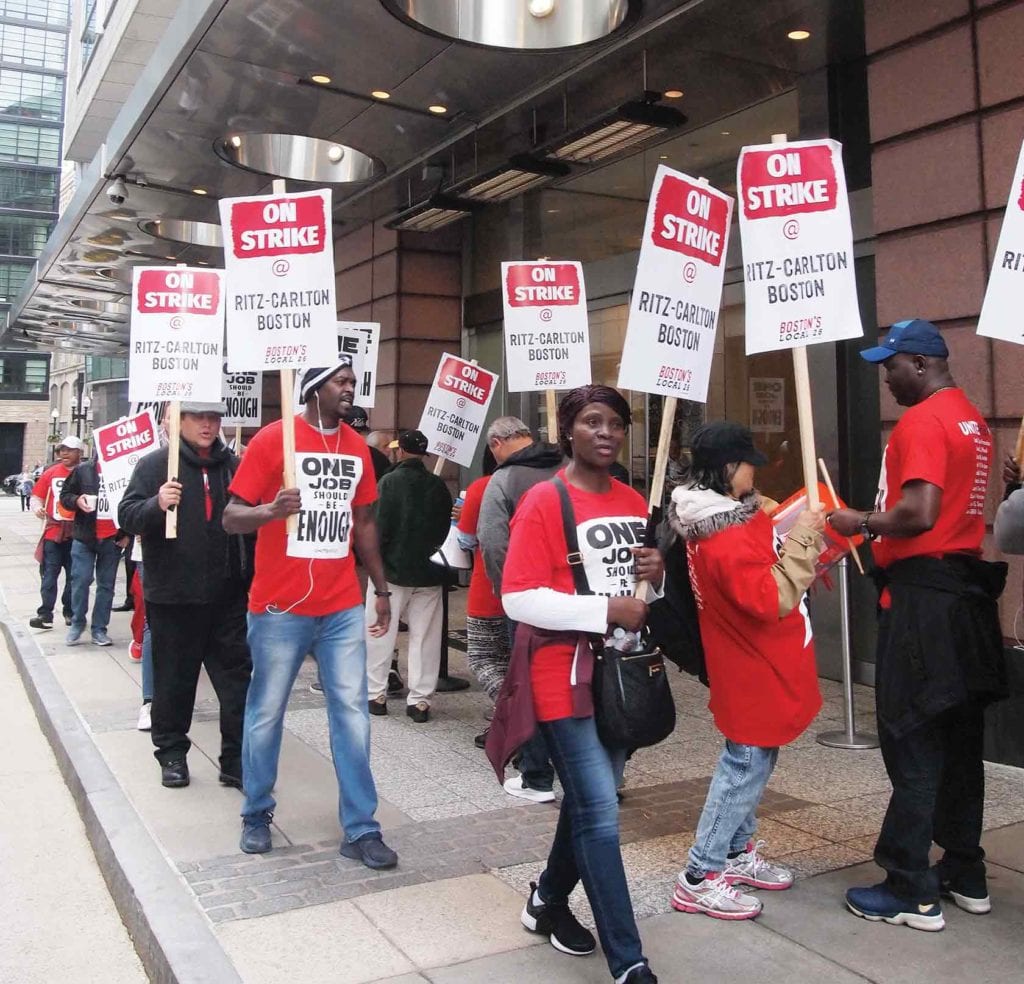Marriott hotel workers go on citywide strike
Decisive action by union members demanding higher wages

Hotel workers took part in coordinated strikes at Marriott hotels across the city Wednesday Oct. 3, as contract negotiations between the billion-dollar hotel chain and union members stalled.

Workers on strike outside the Sheraton Hotel on Dalton Street. Photo: Catherine McGloin
Beating plastic-bucket drums and waving signs, Unite Here Local 26 union members stopped work and circled in front of the Sheraton Hotel on Dalton Street, in one of seven similar strikes beginning last Wednesday at 6 a.m. that also took place at Aloft Boston and the Element Boston, both in the Seaport district, the Ritz-Carlton, the W Hotel Boston, the Westin Boston Waterfront and the Westin Copley Place.
“We’re not looking to get rich, just to make enough money to support our families in the area we live,” said Brian Lang, Unite Here Local 26 president.
More than 1,500 Marriott hotel workers — housekeepers, bartenders, bellmen, cooks, and dishwashers — united under the banner, “One job should be enough.” They have been asking since April, when the latest round of contract negotiations began, for wage increases to cover the rising cost of living in Boston. They are also pushing for guaranteed job security, better health and pension provisions, and for changes to be made to Marriott’s Green Choice initiative, which workers say reduces their hours, slashes their wages and risks their health coverage.
“The cost of living in Boston is enormous,” said Jody Payne, who makes the two-hour, 23-mile commute from Brockton each day to get to her job as a banquet server at the Sheraton, which she has held for 37 years. She can no longer afford to pay rent or a mortgage in the city.
For Payne and other food and drink servers employed by Marriott International, an increase in gratuity would help pay monthly bills. While most restaurants and bars across the city levy an 18-percent-plus gratuity payment, Marriott’s staff members receive 15 percent, an amount that has not been revised for 12 years.
Carlos Daveiga, a Dorchester resident who has worked as a houseman, cleaning the hallways and common areas at the Sheraton, for 19 years, said workers’ modest proposals are what Marriott’s management should have given them five years ago. “Life is now too expensive in Boston,” Daveiga said. “One job should be enough, and Marriott can do better for its employees.”
There is no question that Marriott International can afford their demands, workers say. As one of the largest hotel chains in the world, in 2017 its net worth was more than $49 billion.
Green choice
Workers are also unhappy with the implementation of Marriott’s Green Choice program, which rewards hotel guests for skipping housekeeping services for up to three days during their stay.
“Green Choice is basically a way for the hotel to lay off housekeepers,” said Payne. “It has nothing to do with being green, because this hotel recycles nothing.” Her cynicism is born out of decades working in the Sheraton’s kitchen and dining areas, where she told the Banner she sees very little evidence of recycling or any other environmental initiatives.

Workers on strike outside the Sheraton Hotel on Dalton Street.
Payne described how the Green Choice program dramatically reduces housekeepers’ hours, as they do not know when rooms will need servicing, and this impacts their eligibility for health insurance coverage. If their average number of hours over a three-month period becomes too low to meet the insurer’s minimum requirement, then workers are dropped from their plans for the following three months. Payne said this is particularly harmful for Marriott’s elderly workers, of which she said there are many, who suffer from age-related or other conditions. Without coverage they are unable to pay for medication, leaving them little choice but to continue to work well past retirement age.
Since Sept. 12, when 96 percent of union members voted in favor of strike action, ongoing negotiations between a board of about 30 union members, including Lang, and Marriott International representatives have yielded little agreement on terms.
At time of publication, strikes in Boston were entering their seventh day, with Marriott hotel workers in eight cities, including San Jose, San Francisco and Detroit, forming their own picket lines from Oct 4.
A spokesperson from Marriott International would not respond directly to questions from the Banner, but instead emailed a written statement.
“We are disappointed that Unite Here has chosen to resort to a strike at this time,” the statement read. “Marriott’s current economic proposal matches the economic terms in the parties’ last contract, which included the largest increases in the parties’ bargaining history. We have not proposed any changes to our associates’ health, welfare or retirement benefits.”
These proposals were brought before workers when both sides last met Oct. 1, and were deemed still to be unsatisfactory. “What they bring us is a real joke,” said Daveiga. “We employees, we need more respect.”
“They’re tone deaf,” said Lang. “I don’t think Marriott has quite grasped what we mean by equality.”
Despite setbacks, Lang said he is keeping all lines of communication open with company management and is willing to find collaborative, creative solutions in these negotiations.
“This is an opportunity for Marriott to set an example for the hotel industry … to set a new standard in the hottest hotel market in the world,” said Lang. He acknowledged that Marriott is not the only chain that could improve workers’ conditions, but they are the city’s largest, which is why they have become the union’s primary target.
The union is paying members $300 a week while they spend 12 to 18 hours a day on the picket lines. Calling their participation “a big sacrifice,” Lang added, “I don’t know how long it will take Marriott to come to their senses.”
“We take one day at a time. It’s the only way to win strikes,” he said.






